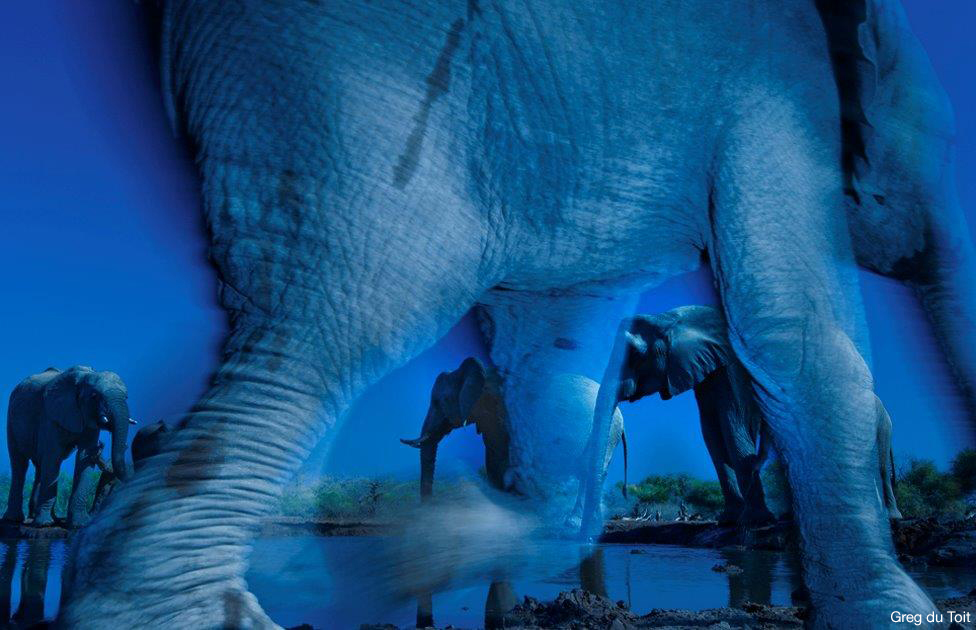Elephants have a mysterious and "tangible energy" according to South African photographer Greg Du Toit.
Now after a 10 year quest, his portrayal of this "energy" has been captured in an award-winning photo.
Titled "Essence of Elephants", the work has earned him the overall title in this year's Wildlife Photographer of the Year competition.
Preparation and passion, he says, were key to achieving the winning shot, taken from just over one metre away.
"There was one particular day when a baby elephant raced past right in front of my camera and I was ready. I had to be prepared for that moment," said Mr Du Toit.
He took the picture at a waterhole in Botswana's Northern Tuli Game Reserve from a hide (a sunken freight container) that provided a ground-level view. He had been going to the area five or six times a year for 10 years.
"I chose elephants because I feel a very special energy and connection when I'm around them," he told BBC News.
"But although you feel that energy it's very difficult to translate that into a camera because an elephant is such a big animal and they're not very charismatic, whereas a predator is far more charismatic."
Authentic momentsUsing a very slow shutter speed on a wide angle lens "allowed all that energy to come into my camera" making him able to depict "these gentle giants in an almost ghostly way".
To achieve the cool blue hue he attached a polarising filter and set his white balance to a cool temperature.
The Wildlife Photographer of the Year (WPY) "means a lot to me for various reasons", said Du Toit, especially because photos were submitted anonymously, putting professionals and amateurs on an equal footing.
"In my mind it's one of the last places in the world you can actually look at a wildlife photo and trust that the moment is authentic."
Chair of the judging panel Jim Brandenburg said: "Greg's image immediately catapults us to African plains. This image stood out for both its technical excellence and the unique moment it captures - it is truly a once in a lifetime shot."
-mother'slittleheadful.jpg)
This year's Young Wildlife Photographer of the year is 14-year-old Udayan Rao Pawar from India.
His photo was of a fresh water crocodile with hatchlings on its head "kind of resembling a crown", explained Mr Pawar.
He crept up on the nestling colony of gharials on the banks of the Chambal River,
Grunting sounds"When the dawn broke early in the morning I hid myself behind a rock, and when the morning light came I took those images.
"I could hear them making little grunting sounds. Very soon a large female surfaced near the shore, checking on her charges. Some of the hatchlings swam to her and climbed onto her head. Perhaps it made them feel safe."
Despite conservation efforts, the gharial fresh water crocodile is on the verge of extinction with an estimated 200 mating pairs remaining.
"The Chambal River is the gharial's last stronghold but is threatened by illegal sand-mining and fishing", added Udayan.
Wildlife photographer and Judge Tui De Roy said the composition and timing of the photograph was perfect.
"The mother's gaze seems directed at you, appealing to you to let her live and thrive in peace. This image is beautiful and thought provoking, but at the same time also wonderfully playful, making it a clear winner," he said.
WPY is one of the most prestigious competitions in world photography. Organised by London's Natural History Museum and BBC Wildlife Magazine, it is now in its 49th year.
Images are submitted anonymously by professional and amateur photographers alike. They are selected for their creativity, artistry and technical complexity and must be submitted as a raw file with no manipulations.
The winners beat 43,000 entries submitted from 96 countries. You can see more images by clicking here. Some viewers may find the last photo in the gallery distressing.
The WPY exhibition opens on Friday 18 October at the Natural History Museum.


 Drones bounce back from collisions
Drones bounce back from collisions